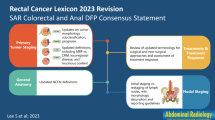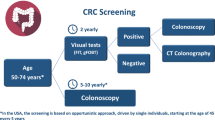Abstract
Objectives
Carcinoembryonic antigen (CEA) is a reliable tumor marker for the management and surveillance of colon cancer. However, limitations in previous studies have made it difficult to elucidate whether CEA should be established as a prognostic indicator. This study examines the association between elevated preoperative CEA levels and overall survival in colon cancer patients using a national population-based registry.
Methods
Stage I–III colon cancer patients were identified from the 2004–2006 National Cancer Database. A multivariable Cox proportional hazards model was used to estimate the association between elevated CEA levels and overall survival after controlling for important patient, hospital, and tumor characteristics. A Monte Carlo Markov Chain was used to impute the large degree of missing CEA data. All models controlled for the propensity score in order to account for selection bias.
Results
A total of 137,381 patients met the inclusion criteria. Overall, 34 % of patients had an elevated CEA level and 66 % had a normal CEA level, with a median survival of 70 and 100 months, respectively. Patients with an elevated CEA level had a 62 % increase in the hazard of death (HR 1.62, 95 % CI 1.53–1.74) compared with patients with a normal CEA level.
Conclusions
Preoperative CEA was an independent predictor of overall survival across all stages. The results support recommendations to include CEA levels as another high-risk feature that clinicians can use to counsel patients on adjuvant chemotherapy, especially for stage II patients.



Similar content being viewed by others
References
Siegel R, Desantis C, Jemal A. Colorectal cancer statistics, 2014. CA Cancer J Clin. 2014;64(2):104–17.
American Cancer Society. Colorectal cancer facts & figures 2011–2013. Atlanta: American Cancer Society; 2011.
Langan RC, Mullinax JE, Raiji MT, et al. Colorectal cancer biomarkers and the potential role of cancer stem cells. J Cancer. 2013;4(3):241–50.
Hundt S, Haug U, Brenner H. Blood markers for early detection of colorectal cancer: a systematic review. Cancer Epidemiol Biomarkers Prev. 2007;16:1935–53.
Duffy MJ, Van dalen A, Haglund C, et al. Tumour markers in colorectal cancer: European Group on Tumour Markers (EGTM) guidelines for clinical use. Eur J Cancer. 2007;43(9):1348–60.
Scheer A, Auer RA. Surveillance after curative resection of colorectal cancer. Clin Colon Rectal Surg. 2009;22(4):242–50.
Steele N, Haigh R, Knowles G, Mackean M. Carcinoembryonic antigen (CEA) testing in colorectal cancer follow up: what do patients think?. Postgrad Med J. 2007;83(983):612–4.
Gold P, Freedman SO (March 1965). Demonstration of tumor-specific antigens in human colonic carcinomata by immunological tolerance and absorption techniques. J Exp Med. 1965;121: 439–62.
Goldstein MJ, Mitchell EP. Carcinoembryonic antigen in the staging and follow-up of patients with colorectal cancer. Cancer Invest. 2005;23(4):338–51.
Thomas SN, Zhu F, Schnaar RL, Alves CS, Konstantopoulos K. Carcinoembryonic antigen and CD44 variant isoforms cooperate to mediate colon carcinoma cell adhesion to E- and L-selectin in shear flow. J Biol Chem. 2008;283(23):15647–55.
Konstantopoulos K, Thomas SN. Cancer cells in transit: the vascular interactions of tumor cells. Annu Rev Biomed Eng. 2009;11:177–202.
Thomas SN, Tong Z, Stebe KJ, Konstantopoulos K. Identification, characterization and utilization of tumor cell selectin ligands in the design of colon cancer diagnostics. Biorheology. 2009;46(3):207–25.
Martin KW, Halpern SE. Carcinoembryonic antigen production, secretion, and kinetics in BALB/c mice and a nude mouse-human tumor model. Cancer Res. 1984;44(12 Pt 1):5475–81.
Staab HJ, Anderer FA. Growth of human colonic adenocarcinoma and development of serum CEA in in athymic mice. I: Strict correlation of tumour size and mass with serum CEA concentration during logarithmic growth. Br J Cancer. 1982;46(6):841–7.
Wanebo HJ, Rao B, Pinsky CM, Hoffman RG, Stearns M, Schwartz MK, et al. The use of preoperative carcinoembryonic antigen level as a prognostic indicator to complement pathological staging. N Engl J Med. 1978;299:448–451.
Blake KE, Dalbow MH, Concannon JP, Hodgson SE, Brodmerkel GJ, Panahandeh AH, et al. Clinical significance of the preoperative plasma carcinoembryonic antigen (CEA) level in patients with carcinoma of the large bowel. Dis Colon Rectum. 1982;25:24–32.
Chu D, Erickson CA, Russell P, Thompson C, Lang MP, Broadwater RJ. Prognostic significance of carcinoembryonic antigen in colorectal cancer. Arch Surg. 1991;125:314–6.
Harrison LE, Guillem JG, Paty P, Cohen AM. Preoperative carcinoembryonic antigen predicts outcome in node negative colon cancer patients: a multivariate analysis of 572 patients. J Am Coll Surg. 1997;185:55–9.
Carriquiry LA, Pineyro A. Should carcinoembryonic antigen be used in the management of patients with colorectal cancer. Dis Colon Rectum. 1999;42:921–9.
Duffy MJ. Carcinoembryonic antigen as a marker for colorectal cancer: is it clinically useful? Clin Chem. 2001;47(4):624–30.
Park IJ, Kim HC, Yu CS, Yoo JH, Kim JC. Cutoff values of preoperative s-CEA levels for predicting survivals after curative resection of colorectal cancer. J Korean Med Sci. 2005;20(4):624–7.
Chung MJ, Chung SM, Kim JY, Ryu MR. Prognostic significance of serum carcinoembryonic antigen normalization on survival in rectal cancer treated with preoperative chemoradiation. Cancer Res Treat. 2013;45(3):186–92.
Thirunavukarasu P, Sukumar S, Sathaiah M, et al. C-stage in colon cancer: implications of carcinoembryonic antigen biomarker in staging, prognosis, and management. J Natl Cancer Inst. 2011;103(8):689–97.
American College of Surgeons. Facility Oncology Registry Data Standards: December 18, 2012. Available at: https://www.facs.org/quality-programs/cancer/ncdb/registrymanuals/cocmanuals/fordsmanual. Accessed 2 June 2015.
Deyo RA, Cherkin DC, Ciol MA. Adapting a clinical comorbidity index for use with ICD-9-CM administrative databases. J Clin Epidemiol. 1992;45(6):613–9.
Little RJA, Rubin DB. Statistical analysis with missing data. New York: Wiley & Sons; 1987.
Gilks WR, Richardson S, Spiegelhalter DJ (eds.) Markov Chain Monte Carlo in practice. London: Chapman & Hall; 1996.
Schafer JL. Analysis of incomplete multivariate data. London: Chapman & Hall; 1997.
Horton NJ, Kleinman KP. Much ado about nothing: a comparison of missing data methods and software to fit incomplete data regression models. Am Stat. 2007;61(1):79–90.
Benson AB, Schrag D, Somerfield MR, et al. American Society of Clinical Oncology recommendations on adjuvant chemotherapy for stage II colon cancer. J Clin Oncol. 2004;22(16):3408–19.
National Comprehensive Cancer Network. http://www.nccn.org (2015). Accessed 16 Jan 2015.
Engstrom PF, Benson AB 3rd, Saltz L. Colon cancer clinical practice guidelines in oncology. J Natl Compr Canc Netw 2003;1:40–53.
Srivastava G, Renfro LA, Behrens RJ, et al. Prospective multicenter study of the impact of oncotype DX colon cancer assay results on treatment recommendations in stage II colon cancer patients. Oncologist. 2014;19(5):492–7.
Maak M, Simon I, Nitsche U, et al. Independent validation of a prognostic genomic signature (ColoPrint) for patients with stage II colon cancer. Ann Surg. 2013;257(6):1053–8.
Fakih MG, Padmanabhan A. CEA monitoring in colorectal cancer. What you should know. Oncology (Williston Park). 2006;20(6):579–87.
Swanson RS, Compton CC, Stewart AK, et al. The prognosis of T3N0 colon cancer is dependent on the number of lymph nodes examined. Ann Surg Oncol. 2003;10:65–71.
Le Voyer TE, Sigurdson ER, Hanlon AL, et al. Colon cancer survival is associated with increasing number of lymph nodes analyzed: a secondary survey of intergroup trial INT-0089.
Soeth E, Wirth T, List HJ, et al. Controlled ribozyme targeting demonstrates an antiapoptotic effect of carcinoembryonic antigen in HT29 colon cancer cells. Clin Cancer Res. 2001;7(7):2022–30.
Laguinge L, Bajenova O, Bowden E, Sayyah J, Thomas P, Juhl H. Surface expression and CEA binding of hnRNP M4 protein in HT29 colon cancer cells. Anticancer Res. 2005;25(1A):23–31.
Wirth T, Soeth E, Czubayko F, Juhl H. Inhibition of endogenous carcinoembryonic antigen (CEA) increases the apoptotic rate of colon cancer cells and inhibits metastatic tumor growth. Clin Exp Metastasis. 2002;19(2):155–60.
Financial Support
Adan Z. Becerra, Christian P. Probst, Mohamedtaki A. Tejani, Christopher T. Aquina, Maynor G. González, Bradley J. Hensley, Katia Noyes, John R. Monson, and Fergal J. Fleming have no research support or other disclosures to declare.
Author information
Authors and Affiliations
Corresponding author
Rights and permissions
About this article
Cite this article
Becerra, A.Z., Probst, C.P., Tejani, M.A. et al. Evaluating the Prognostic Role of Elevated Preoperative Carcinoembryonic Antigen Levels in Colon Cancer Patients: Results from the National Cancer Database. Ann Surg Oncol 23, 1554–1561 (2016). https://doi.org/10.1245/s10434-015-5014-1
Received:
Published:
Issue Date:
DOI: https://doi.org/10.1245/s10434-015-5014-1




